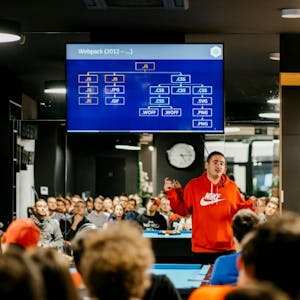March 24 - 25, 2022

Online
DevOps.js Conf 2022
The JavaScript DevOps Conference
The Zen of Yarn
31 min
The Zen of Yarn
In the past years Yarn took a spot as one of the most common tools used to develop JavaScript projects, in no small part thanks to an opinionated set of guiding principles. But what are they? How do they apply to Yarn in practice? And just as important: how do they benefit you and your projects?
In this talk we won't dive into benchmarks or feature sets: instead, you'll learn how we approach Yarn’s development, how we explore new paths, how we keep our codebase healthy, and generally why we think Yarn will remain firmly set in our ecosystem for the years to come.
In this talk we won't dive into benchmarks or feature sets: instead, you'll learn how we approach Yarn’s development, how we explore new paths, how we keep our codebase healthy, and generally why we think Yarn will remain firmly set in our ecosystem for the years to come.
Why is CI so Damn Slow?
27 min
Why is CI so Damn Slow?
We've all asked ourselves this while waiting an eternity for our CI job to finish. Slow CI not only wrecks developer productivity breaking our focus, it costs money in cloud computing fees, and wastes enormous amounts of electricity. Let’s take a dive into why this is the case and how we can solve it with better, faster tools.
pnpm – a Fast, Disk Space Efficient Package Manager for JavaScript
31 min
pnpm – a Fast, Disk Space Efficient Package Manager for JavaScript
You will learn about one of the most popular package managers for JavaScript and its advantages over npm and Yarn.A brief history of JavaScript package managersThe isolated node_modules structure created pnpmWhat makes pnpm so fastWhat makes pnpm disk space efficientMonorepo supportManaging Node.js versions with pnpm
Fine-tuning DevOps for People over Perfection
33 min
Fine-tuning DevOps for People over Perfection
Top ContentDemand for DevOps has increased in recent years as more organizations adopt cloud native technologies. Complexity has also increased and a "zero to hero" mentality leaves many people chasing perfection and FOMO. This session focusses instead on why maybe we shouldn't adopt a technology practice and how sometimes teams can achieve the same results prioritizing people over ops automation & controls. Let's look at amounts of and fine-tuning everything as code, pull requests, DevSecOps, Monitoring and more to prioritize developer well-being over optimization perfection. It can be a valid decision to deploy less and sleep better. And finally we'll examine how manual practice and discipline can be the key to superb products and experiences.
Levelling up Monorepos with npm Workspaces
33 min
Levelling up Monorepos with npm Workspaces
Top ContentLearn more about how to leverage the default features of npm workspaces to help you manage your monorepo project while also checking out some of the new npm cli features.
The Inner Workings of Vite Build
31 min
The Inner Workings of Vite Build
Vite unbundled ESM dev server and fast HMR are game-changing for DX. But Vite also shines when building your production applications.This talk will dive into how the main pieces fit together to bundle and minify your code:Vite build as an opinionated Rollup setup.How esbuild is used as a fast TS and JSX transpile and a minifier.The production plugins pipeline.Modern frameworks (Nuxt, SvelteKit, Astro, among others) have chosen Vite, augmenting the DX and optimizations for their target use case.We'll discover Vite as a polished and extendable toolkit to craft optimized modern apps.
How to Secure Your Node.js Containers on Kubernetes With Best Practices
34 min
How to Secure Your Node.js Containers on Kubernetes With Best Practices
Learn security best practices for Kubernetes and especially for securing applications built with NodeJS running on Kubernetes. We will talk about securing the cluster, your Node.js containers, and more. We will also look at how to use OIDC to secure access to the clusters.
A Simple, Yet Powerful Approach to Clean Code!
8 min
A Simple, Yet Powerful Approach to Clean Code!
In this session, I'll use a demo to demonstrate how you can easily take ownership of your Code Quality with SonarCloud. You'll see how a simple, automated methodology ensures you and your Team to only commit Clean Code.
All About Dependencies
8 min
All About Dependencies
The benefit of software dependencies is that they allow developers to deliver software faster building on previous code. Dependencies are integral part of the software development cycle and they will be used at different stages i.e. development, execution or testing. Yet dependencies not only may introduce risks that are often overlooked, but their fast resolution and compliance with license types must be taken into consideration. In this extremely fast session we will see some of the advantages of using a mature, robust artifact manager for npm, bower and other package managers.
Automated Application Security Testing
9 min
Automated Application Security Testing
Traditional security testing for JS apps has focused on the front-end, but actual security issues most often lie in the backing REST API. Join StackHawk co-founder Scott Gerlach for a quick overview of why you need to rethink how you test your JS apps and how StackHawk can help you find and fix security bugs fast.
Monitoring Errors and Slowdowns Across JS Applications
8 min
Monitoring Errors and Slowdowns Across JS Applications
Learn about tools to trace frontend to backend data and increase visibility on errors and performance. We'll go through how to know which teams are responsible for which error, what the impact is, and all the context needed to solve it.
Independence: What Does It Mean For DevOps?
6 min
Independence: What Does It Mean For DevOps?
Vultr's Walt Ribeiro takes users through steps to easily produce websites with Vultr using their One-Click Marketplace and Object Storage. In this talk, Walt will demonstrate how to configure your account, how to browse and deploy from Vultr Marketplace, and how to stand up a basic website using a simple web or mobile-based UI. Other flagship products and tools developers love will be highlighted along the way!
Enter CDK: What this Means for the World of IaC
13 min
Enter CDK: What this Means for the World of IaC
CDK is growing in popularity in the AWS ecosystem, and is set to be the successor of CloudFormation, being built natively for the configuration of AWS resources. Learn how this is a game changer for NodeJS programmers & stacks.
It's a Jungle Out There: What's Really Going on Inside Your Node_Modules Folder
32 min
It's a Jungle Out There: What's Really Going on Inside Your Node_Modules Folder
Do you know what’s really going on in your node_modules folder? Software supply chain attacks have exploded over the past 12 months and they’re only accelerating in 2022 and beyond. We’ll dive into examples of recent supply chain attacks and what concrete steps you can take to protect your team from this emerging threat.
1001 Packages – Strategies for Managing Monorepos
24 min
1001 Packages – Strategies for Managing Monorepos
When working with a monorepo, there are multiple Challenges: packages installation, packages linking, development processes (build, lint, testing) and deployment processes. Those challenges vary the type of artifacts in our monorepo (micro services, FE App, packages etc.). We will explore different approaches and tools for monorepos and their pro and cons.
Releasing JavaScript Applications Faster with Feature Flags
10 min
Releasing JavaScript Applications Faster with Feature Flags
Do you want to release your applications more rapidly with lower risk? Feature flags make this possible. This talk will concretely demonstrate that this is possible and easily within your reach.
Optimize Node.js Development Workflows in Kubernetes with Skaffold and Rancher Desktop
9 min
Optimize Node.js Development Workflows in Kubernetes with Skaffold and Rancher Desktop
In this talk, you will learn how to optimise your Node.js development and release workflow to Kubernetes with Skaffold and Rancher Desktop. Using these tools together helps enhance the local K8s development experience mirroring a real cluster experience, as well as the release workflow you would have for your remote cluster. We will cover the challenges of local Kubernetes development, how Skaffold and Rancher Desktop help, demonstrations of local releases to a cluster and how to use the same configuration for remote cluster releases.
Gaming the System: How Video Games Can Help us Create More Effective Virtual Teams
7 min
Gaming the System: How Video Games Can Help us Create More Effective Virtual Teams
What does Conway's Law have in common with the video game League of Legends? They can both teach us about how to organise development teams that achieve collective intelligence. When it comes to the art of software development, it's never a game of chance
Serverless for Frontends
8 min
Serverless for Frontends
In this talk micro frontend expert Florian Rappl will introduce the pattern of creating a Siteless UI. This is a frontend composed of different pieces that can be developed independently and are deployed without having or managing any server. Florian will show you how to get started in that space, what decisions to take, and what pitfalls you should avoid.
Experimenting with Deno for Easier Kubernetes Deployments
31 min
Experimenting with Deno for Easier Kubernetes Deployments
As we all know, dealing with Kubernetes YAML is not very intuitive (especially for those just getting starting) and the more resources and dependencies are added the messier and more complex the process becomes. In this talk, we'll explore how we can use Typescript and Deno to bring typing, composition, code-reuse, and testing as an alternative to YAML - that doesn't include these capabilities, all while still remaining declarative and easy to use.
Observability for Microfrontends
24 min
Observability for Microfrontends
Teams are getting bigger and bigger following the micro-frontends architecture. Observability for teams on a scale becomes even more important in order not only to be able to identify potential issues in the runtime, but also separating the responsibilities. In this presentation we’ll learn how this can achieved.
The Lazy Developer Guide: How to Automate Code Updates?
22 min
The Lazy Developer Guide: How to Automate Code Updates?
How to update hundreds of projects all at once? With organizations rapidly growing, demand for the scalability of the teams grows which directly impacts projects structure and ownership. The usual dilemma is mono- vs. multi-repos, but ... What if I tell you that it does not matter much? Both approaches can punch you in the face at some point, so perhaps it is better to think bottom-up.
Today I will walk you through some of the biggest challenges that exist in both approaches and those are managing dependencies across a few hundred projects, global code updates and many other things. I will also show you examples of how we solved this inside Infobip through building our own internal libraries.
Today I will walk you through some of the biggest challenges that exist in both approaches and those are managing dependencies across a few hundred projects, global code updates and many other things. I will also show you examples of how we solved this inside Infobip through building our own internal libraries.


















